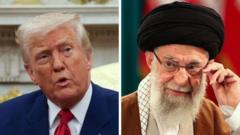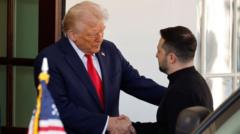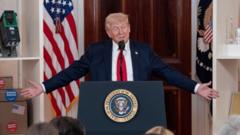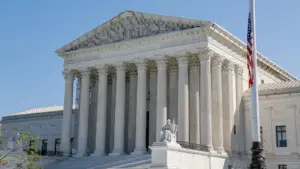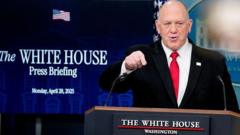As the US sees its first economic contraction in three years, Trump shifts blame while promoting investments.
Trump Appeals for Patience as US Economy Experiences Contraction
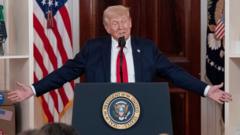
Trump Appeals for Patience as US Economy Experiences Contraction
President requests more time to address economic difficulties amid downturn fears.
In a recent gathering with business leaders at the White House, President Donald Trump requested a "little bit of time" to address challenges facing the US economy, which has contracted for the first time in three years, raising alarm over a potential recession. The contraction, reported at an annual rate of 0.3% by the US Commerce Department, follows a substantial growth rate of 2.4% in the previous quarter. Trump sought to downplay this data, attributing the dip to stockpiling imports ahead of new tariffs he implemented.
While asserting that $8 trillion in inward investment had been pledged, Trump expressed confidence that this commitment would reinvigorate American manufacturing. He remarked, “This is Biden's economy because we took over on January 20th,” pushing back on criticisms surrounding his administration’s economic management. However, his comments drew sharp rebukes from Democratic leaders, including Congressman Hakeem Jeffries, who asserted that the economic situation was a direct consequence of Trump’s policies.
During the event, Trump highlighted anticipated investments in key sectors such as technology, healthcare, and infrastructure, and welcomed the CEOs of several major corporations, including Hyundai and Toyota. He reiterated the importance of Congress passing his proposed tax bill, which encompasses extensive tax cuts and spending reductions, yet is facing resistance from both Democrats and some within his own party.
Additionally, in a televised appearance earlier that day with his cabinet members, Trump downplayed concerns regarding shortages of consumer goods amid the escalating trade tensions, remarking that children might simply have to make do with fewer toys at a slightly higher cost. This comes as his administration has enforced a cascade of tariffs on various imports, including a staggering 245% on certain Chinese goods, spurring an all-out trade conflict with China. As the economic landscape shifts, the implications for both the domestic and global markets continue to unfold.
While asserting that $8 trillion in inward investment had been pledged, Trump expressed confidence that this commitment would reinvigorate American manufacturing. He remarked, “This is Biden's economy because we took over on January 20th,” pushing back on criticisms surrounding his administration’s economic management. However, his comments drew sharp rebukes from Democratic leaders, including Congressman Hakeem Jeffries, who asserted that the economic situation was a direct consequence of Trump’s policies.
During the event, Trump highlighted anticipated investments in key sectors such as technology, healthcare, and infrastructure, and welcomed the CEOs of several major corporations, including Hyundai and Toyota. He reiterated the importance of Congress passing his proposed tax bill, which encompasses extensive tax cuts and spending reductions, yet is facing resistance from both Democrats and some within his own party.
Additionally, in a televised appearance earlier that day with his cabinet members, Trump downplayed concerns regarding shortages of consumer goods amid the escalating trade tensions, remarking that children might simply have to make do with fewer toys at a slightly higher cost. This comes as his administration has enforced a cascade of tariffs on various imports, including a staggering 245% on certain Chinese goods, spurring an all-out trade conflict with China. As the economic landscape shifts, the implications for both the domestic and global markets continue to unfold.

